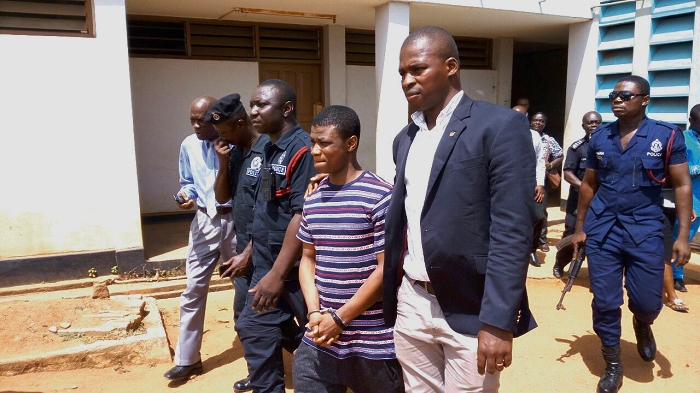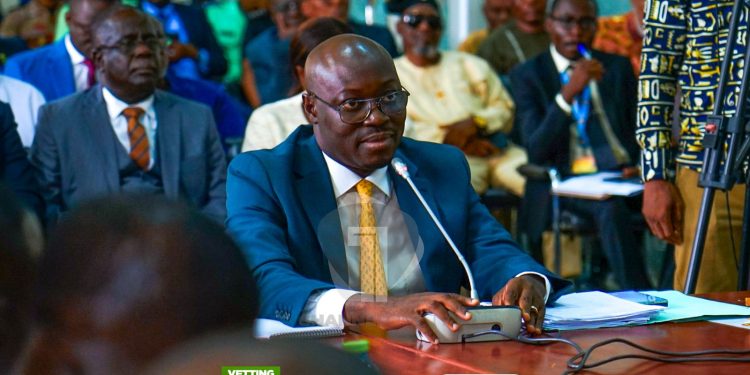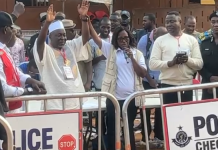The long-running murder trial of Daniel Asiedu, accused of killing former Abuakwa North MP JB Danquah Adu, is set for a retrial after a hung jury delivered an inconclusive verdict.
A jury of seven members voted 4:3 in favor of acquitting Asiedu, prompting Justice Lydia Osei Marfo to discharge the jury in accordance with Section 285(4) of the Criminal and Other Offenses (Procedure) Act, 1960 (Act 30). The judge ruled that the split decision was inconclusive and insufficient to either convict or acquit the accused.

Despite the jury’s split decision, Daniel Asiedu, who has been in custody since his arrest in 2016, will remain in detention pending the retrial. The high-profile case, which has gripped public attention for nearly nine years, revolves around the brutal murder of JB Danquah Adu, who was fatally stabbed in his home at Shiashie, Accra.
Details of the Case
The prosecution claims that on the night of February 8, 2016, Daniel Asiedu gained access to the MP’s residence by climbing a ladder to enter through a window. The security guard on duty was reportedly asleep at the time. Asiedu allegedly struggled with the MP before stabbing him in the chest and neck, leading to his death. The accused then stole three phones and fled the scene.
Investigators later discovered that Asiedu sustained a knife wound on his palm during the altercation. He allegedly washed the blood off at a nearby house. The phones stolen from the MP were traced to Asiedu, as witnesses testified that he handed them over to acquaintances to charge and unlock.
The prosecution presented eight witnesses, including the MP’s driver, Samuel Berko Sarkodie, who narrated his boss’s activities on the day of the incident. Security guard Stephen Apraku testified about noticing the repositioned ladder and discovering the MP’s lifeless body.
Two witnesses, brothers with ties to Asiedu’s girlfriend, testified that Asiedu gave them the MP’s phones shortly after the crime. One of them, upon seeing JB Danquah’s photos on the unlocked phone, contacted the police, leading to Asiedu’s arrest.
Scientific evidence included DNA analysis linking Asiedu to the crime scene. The pathologist’s report concluded that the MP died from exsanguination caused by stab wounds to the chest and neck.
Defense’s Argument
Asiedu’s defense team, led by Rev. Yaw Darkwa, argued that the prosecution’s case lacked concrete evidence. They claimed the police fabricated the story to implicate their client. The defense pointed out inconsistencies in the evidence, such as the absence of forensic tests on the alleged murder weapon and the delay in the pathologist’s report, which was written two years after the autopsy.
Rev. Darkwa also questioned the credibility of the DNA analysis, arguing that it was conducted by a third-party laboratory and not directly by the prosecution’s expert. Additionally, he criticized the jury’s inability to examine the phones in question, which he claimed could have clarified doubts about ownership.
Implications of the Retrial
The retrial is expected to address unanswered questions and provide an opportunity to re-examine the evidence. Key areas of focus will include the DNA analysis, the alleged murder weapon, and the reliability of witness testimonies.
The family of JB Danquah Adu has expressed hope that the retrial will deliver justice and closure after years of legal battles. Public interest in the case remains high, with many calling for a swift and fair resolution to one of Ghana’s most significant murder trials.
As the case heads for a retrial, the judicial system faces heightened scrutiny to ensure that justice is served, not only for the late MP and his family but also to uphold public confidence in Ghana’s legal process.
























































![[FREE FREE MONEY] Predict and Win a Guaranteed GH¢200 From Us EVERY WEEK](https://wordpress.ghanatalksradio.com/wp-content/uploads/2022/02/Predict-and-Win-Final-09-03-2021-218x150.jpg)
![[Predict & Win – 8th/Oct.] WIN A Guaranteed ¢200 From Us This Week](https://wordpress.ghanatalksradio.com/wp-content/uploads/2021/10/maxresdefault-16-218x150.jpg)
![[Predict & Win – 2nd] WIN A Guaranteed ¢200 From Us This Week](https://wordpress.ghanatalksradio.com/wp-content/uploads/2021/09/maxresdefault-50-218x150.jpg)
![[Predict & Win – 25th] WIN A Guaranteed ¢200 From Us This Week](https://wordpress.ghanatalksradio.com/wp-content/uploads/2021/09/maxresdefault-36-218x150.jpg)
![[Predict & Win – 18th] WIN A Guaranteed ¢200 From Us This Week](https://wordpress.ghanatalksradio.com/wp-content/uploads/2021/09/maxresdefault-23-218x150.jpg)








![[National cathedral] See full list of churches that have contributed since 2018](https://wordpress.ghanatalksradio.com/wp-content/uploads/2020/09/Ghana-National-Cathedral-GhanaTalksRadio-100x70.jpg)



